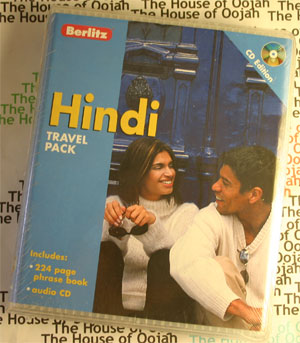Bertlitz Hindi Travel Pack Audio CD and Phrase Book
Berlitz Hindi Travel PackPhrase Book and Audio CD |
 |
Berlitz Hindi Travel Pack - Phrase Book and Audio CDBrand New
: Includes 224 page phrase book
and Audio CD
About the Hindi Language
The native speakers of Hindi dialects between them account for 40% of the Indian population (1991 Indian census). Standard Hindi is one of the 22 official languages of India, and is used, along with English, for administration of the central government. Standard Hindi is a Sanskritized register derived from the khari boli dialect. Urdu is a different, Persianized, register of the same dialect. Taken together, these registers are historically also known as Hindustani. "Hindi" as the term for a language is used in at least four different but overlapping senses: 1. defined regionally, Hindi languages, i.e. the dialects native to Northern India in a narrower sense, the Central zone dialects, divided into Western Hindi and Eastern Hindi 2. defined historically, the literary dialects of Hindi literature, that is, historical regional standards such as Braj Bhasha and Avadhi. The word Hindī is of Persian origin and literally means "Indian", comprising Hind "India", and the adjectival suffix -ī. The word was originally used by Muslims in north India to refer to any Indian language: for example the eleventh-century writer Abū Rayhān al-Bīrūnī used it to refer to Sanskrit. By the 13th century, "Hindi", along with its variant forms "Hindavi" and "Hindui", had acquired a more specific meaning: the "linguistically mixed speech of Delhi, which came into wide use across north India and incorporated a component of Persian vocabulary". It was later used by members of the Mughal court to distinguish the local vernacular of the Delhi region where the court was located from Persian, which was the official language of the court. Evidence from the 17th century indicates that the language then called "Hindi" existed in two differing styles: among Muslims it was liable to contain a larger component of Persian-derived words and would be written down in a script derived from Persian, while among Hindus it used a vocabulary more influenced by Sanskrit and was written in Devanagari script. These styles eventually developed into modern Urdu and modern Hindi respectively. However the word "Urdu" was not used until around 1780: before then the word "Hindi" could be used for both purposes. The use of "Hindi" to designate what would now be called "Urdu" continued as late as the early twentieth century. Nowadays Hindī as taken to mean "Indian" is chiefly obsolete; it has come to specifically refer to the language(s) bearing that name.
|
Berlitz Hindi Travel Pack - Phrase Book and Audio CD |
| Retail: | $35.95 |
| On Sale: | $29.95 |
| You Save: | 17% |
| Stock Info: | Out Of Stock |
| Receive In Stock Notification |

 0 Items (Empty)
0 Items (Empty)